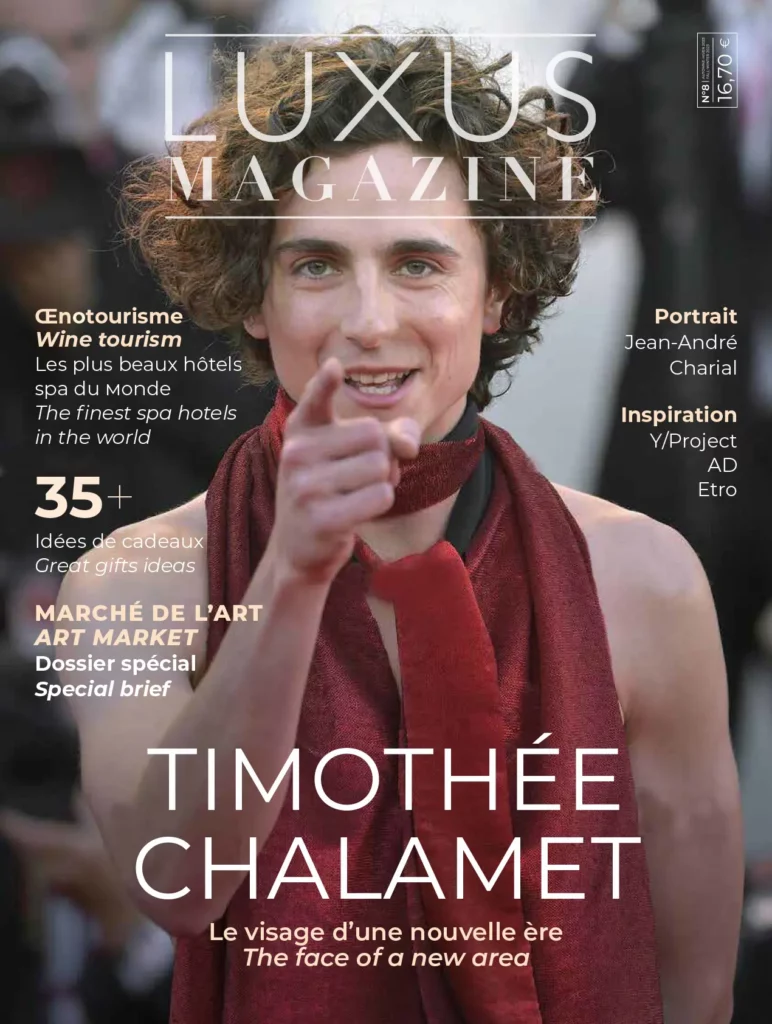Gaston Savina, a chef like no other

Gaston Savina is not a classic chef. As a private chef, he works for big brands as well as for very exclusive clients. On the occasion of the broadcast of Season 14 of Top Chef, in which he was a candidate before being eliminated on March 15, Gaston talks to us in more detail about the particular exercise of his profession, his cooking and his adventure in the M6 show. Interview.
What motivated you to become a chef, and how did you start your career?
I started with a classic course at the Alexandre Dumaine hotel school in Macon, Burgundy. In three years, I obtained a Bac pro hotel and restaurants, crowning a double training in cooking and service in the first year and a specialty of my choice in the second and third years. My teachers had argued over my choice of this specialty during the second year. They both wanted me, but I chose cooking because I thought it would be easier to change jobs if necessary. I would say that, in the end, my job is a good balance between cooking and serving.
You are a private chef, what exactly does your job involve?
My job is commonly called housekeeping. I don’t intervene in the day-to-day running of the house, with all the problems that this entails, such as different meals for the children, etc. I manage the big family vacations, the parties and the big private events like birthdays, baptisms… I am not a caterer; I don’t have a lab. I work directly in people’s homes, I set up the table, I work with the teams on site. Nowadays, luxury brands love this kind of private and exclusive dinner: no more restaurants, they want to offer something unique to their customers, a decor, a menu, a chef that customers will not find elsewhere.
What is your relationship with the world of luxury?
Luxury represents 70% of my clientele, a very small portfolio in the end, less than a hundred clients, but handpicked, prestigious brands that I have met over time since the launch of my company. The world of luxury does not belong to me, I have the chance to enjoy a few privileged moments. But in the evening, I return home to my pleasant, simple life with my roommate.
Can you give us an overview of your culinary creation process and how you choose the ingredients for your dishes?
There is no process, there are desires, encounters, products, discoveries, revelations and a string of logical agreements in my head. Then there is work, some trials, failures…and beautiful discoveries.
You now work in London; how do you adapt to different types of cuisine or food cultures?
Nowadays, with social networks, media coverage, and especially a 2 hour and 30 minutes’ drive, I’m not sure there is a big difference with Paris. But I find a lot of good things there, a return to a certain simplicity as well. I enjoy eating a little earlier. And I can’t say I miss bread; I live next door to the best French artisanal bakery in London!
What importance do you attach to eco-responsibility and how does this translate into your business?
In the world in which we live, the question of ecology is inevitable. As a city councilor, my mother defends this cause, and I deeply respect her convictions. As a caring person, she is a true source of inspiration and education for me on this subject. Moreover, because of my education with my grandparents after my father’s death, I was confronted with a real anti-waste, local and responsible cooking. My grandparents practiced it naturally, without militancy. We collected rainwater, we ate locally, in season, we went to pick mushrooms, we heated with wood a house at 18 degrees, where we wore sweaters.
The media coverage and the promotion of a more eco-responsible and ecological approach is, for us, chefs (fes), a real added value. We are ambassadors of craftsmanship, the gateway to know-how, and messengers and spokespersons for future generations. And we remain a direct “human” link between producers and consumers.
Why did you decide to participate in Top Chef (from which Gaston Savina was eliminated on March 15, editor’s note) when your career as a chef is apparently well-launched?
I was looking to highlight and give some visibility to the profession of Private Chef. I thus approached the competition with a lot of distance and serenity because I have the luck and the privilege of not being in need of either media or financial support. But I receive a lot of messages about my training and my career and I thought that this field should be better known by the general public.
How did you prepare for your participation in Top Chef?
There was no preparation; I just accepted the Topchef adventure when the casting confirmed my presence. At the time, I was in the middle of a mission abroad for clients. I arrived in Paris two days before the beginning!
What made you different from the other candidates?
Probably my background. I’ve been on shoots before, I wasn’t stressed, and in all honesty, I did Top Chef for me. My company works, and I had nothing to lose.
How did you handle the pressure of the competition, and how did you prepare yourself mentally for each challenge?
For each challenge, I tell myself that I must enjoy myself, carry the messages that are dear to me, stay true to myself, and support others. It’s by being a good person that you can do great things. My greatest pride in Top Chef is to have remained very close to almost all the candidates. I am so proud of us, and I can’t wait to ride the wave of culinary collaborations with them. Top Chef is, above all a group of passionate people who meet and want to work together on beautiful projects.
What are your future professional projects and how can participating in Top Chef help you achieve them?
My main project is to be happy or at least to stay happy! Top Chef has nothing to do with that. But I think that you have to feel good about yourself to be able to face the media. As for the professional part, I hope for prosperity that lasts, with projects full of encounters. Because that’s what Top Chef is all about: exposing our profiles and meeting lots of passionate people ready to promote their products and know-how.
Read also > ARNAUD DONCKELE : THE TASTE IN HERITAGE
Featured photo : © Presse
[EN] CLAIRE DOMERGUE, A SPECIALIST IN COMMUNICATION IN THE LUXURY SECTOR, HAS SURROUNDED HERSELF WITH EXPERTS TO CREATE THE FIRST MEDIA DEDICATED TO THE ECONOMIC NEWS OF LUXURY AND FASHION. THE LATTER DRAWS THE ATTENTION OF ITS READERS TO ALL THE MAJOR PLAYERS IN THESE SECTORS WHO SHARE THEIR EXPERIENCES, VISIONS AND KNOW-HOW. MORE THAN A SPECIALIZED WEBZINE, LUXUS PLUS IS A MULTI-SECTOR INFORMATION SYSTEM, WHICH HAS BECOME THE REFERENCE MONITORING TOOL FOR LUXURY AND FASHION PROFESSIONALS. OUR NEWSLETTERS CONTRIBUTE TO MAKE OUR READERS AWARE OF THE CHANGES AFFECTING THE LUXURY INDUSTRIES. THANKS TO AN INCREASED WATCH AND AN EXCELLENT KNOWLEDGE OF THE SECTOR, WE ARE INTERESTED IN THE MAIN ECONOMIC AND TECHNOLOGICAL STAKES OF FASHION, FINE WATCHMAKING, JEWELRY, GASTRONOMY, COSMETICS, PERFUMES, HOTELS, PRESTIGIOUS REAL ESTATE...********[FR] Claire Domergue, spécialiste de la communication dans le secteur du luxe, s’est entourée d’experts pour créer le premier média consacré à l’actualité économique du Luxe et de la mode. Ce dernier attire tout particulièrement l’attention de ses lecteurs sur l’ensemble des acteurs majeurs de ces secteurs qui y partagent leurs expériences, visions et savoir-faire. Plus qu’un webzine spécialisé, Luxus Plus est un système d’information multi-sectoriel, devenu l’outil de veille de référence pour les professionnels du luxe et de la mode. Nos newsletters de veille contribuent en effet à sensibiliser nos lecteurs aux mutations qui touchent les industries du luxe. Grâce à une veille accrue et à une excellente connaissance du secteur, nous nous intéressons aux principaux enjeux économiques et technologiques de la mode, la haute horlogerie, la joaillerie, la gastronomie, des cosmétiques, parfums, de l’hôtellerie, l’immobilier de prestige…



